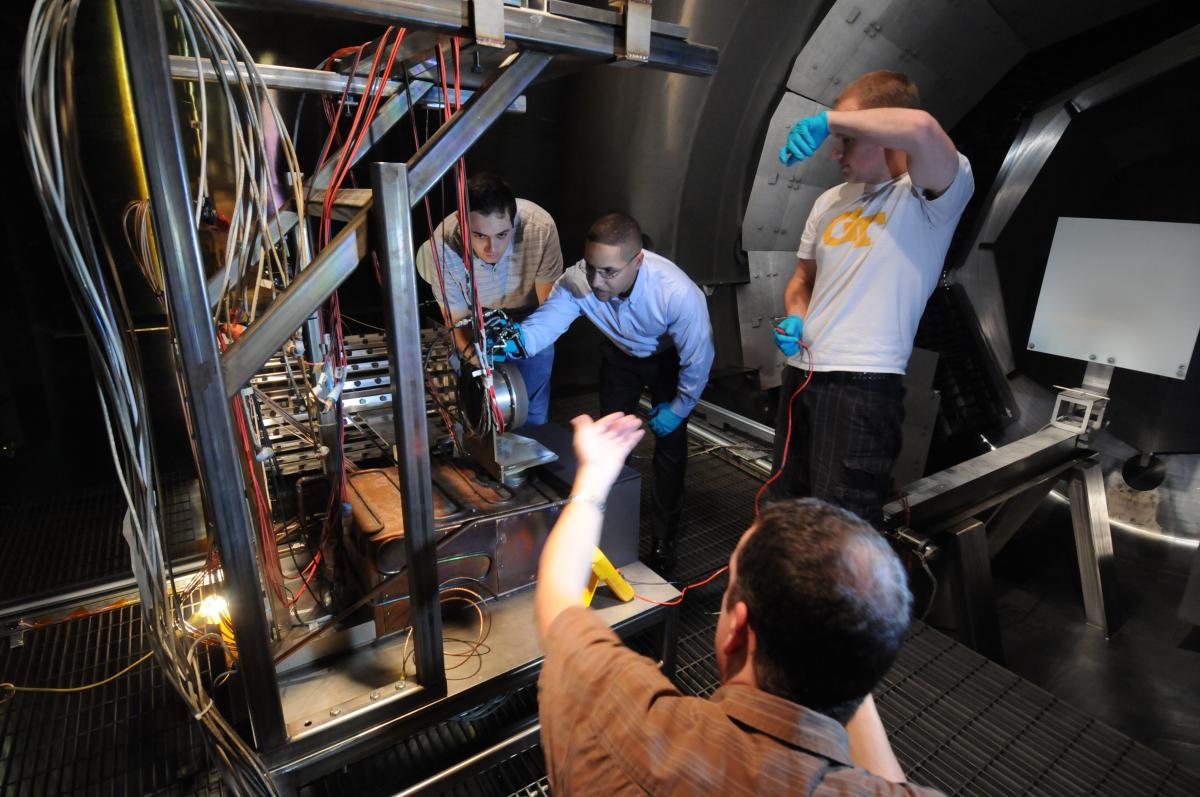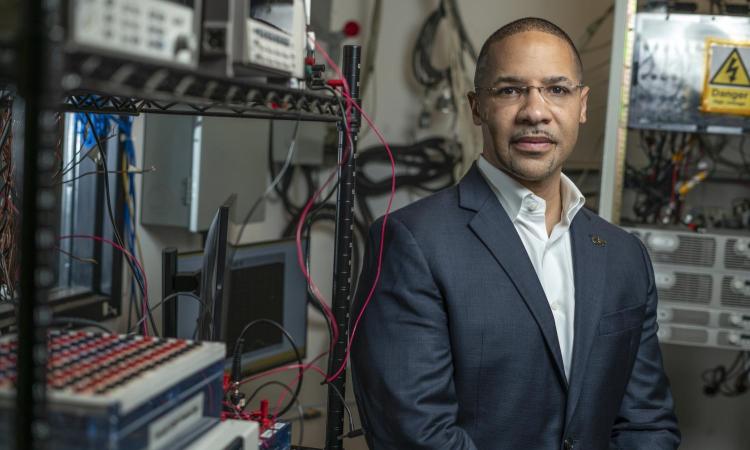Chair Mitchell Walker sees the best days are ahead for the AE School.
The Daniel Guggenheim School of Aerospace Engineering (AE) is uniquely positioned as a prime force in aerospace for the state of Georgia and for the nation at large. It prepares a significant fraction of the aerospace engineers in the United States, and that requires recruiting, expanding, and developing top talent, as well as giving its best and brightest the space to soar. Leading the charge is the new AE Chair and William R.T. Oakes Professor Mitchell Walker, who shared what’s on the horizon for AE.
Led to Lead, Back to Serve
The Cassopolis, Michigan native first visited the Atlanta campus in January 2004 through the Georgia Tech FOCUS Program, which invites underrepresented minority students to explore the campus and participate in tours, workshops, panels, and one-on-one faculty meetings. The FOCUS scholar spent the day meeting everybody in the AE program, including Gary May, a professor in the School of Electrical and Computer Engineering at the time who later became the dean of the College of Engineering (CoE). Walker liked the environment so much that he told the AE Chair, Robert Loewy that he wanted to work at Georgia Tech. Later he interviewed for a position. Soon after, he started his career in AE as an assistant professor in 2005, armed with his bachelor’s, master’s, and doctoral degrees in aerospace engineering from the University of Michigan.
“The research direction I pursued was somewhat unconventional. I sought a school that could support and value my interests, complementing my aspirations. Georgia Tech emerged as a fitting choice due to its strong program in gas turbines and jet engines. Because there wasn’t a concentration in space propulsion at that time, I saw the potential to develop a niche, and that excited me,” said Walker, founder and director of the High-Power Electric Propulsion Laboratory (HPEPL).
Nineteen years later, he has come full circle as the first Black chair in AE with a clear mission to expand and amplify the already great things happening at the School. His career at Georgia Tech has been a steady and notable climb of achievement in research, leadership, and mentorship. His experiences as the AE associate chair for graduate programs and the associate dean for academic affairs in CoE have given him valuable insights into getting things done on campus. Fortunately, he’s just as passionate about AE as the first day he toured it.

Walker in the lab
Enhancing the Academic and Research Program with a Purpose
AE boasts the number two undergraduate program and the number four graduate program in the nation. It combines classroom instruction, laboratory work, and research experience into the curriculum to prepare students for the workforce. AE recorded $43 million in research expenditures for 2023.
“Georgia Tech has a broad aerospace program, and I’ve seen it evolve. We love the research and science, but we also build things here,” Walker shared. “We’re the only CoE major that promises students they will learn to build an entire vehicle and to understand the design of a system. You’re going to learn to build a spacecraft, aircraft, rocket, or helicopter.”
There are limitless directions for AE to expand academically.
We’re going to build a road to space so that our kids and their kids can build the future. And we need to do that. We need to do that to solve the problems here on Earth. It’s not about escaping.
Blue Origin and Amazon Founder, Jeff Bezos
“There are clearly significant growth areas in aerospace, whether it's our capability in computational analysis for structures, fluids, design, propulsion, or artificial intelligence. These advancements are rapidly emerging, showcasing the intersection between controls and autonomy, as well as the integration of machine learning and AI,” Walker explained. “As evidenced by our recent faculty hires, we are strategically aligning our expertise with these cutting-edge domains, and we are poised for further advancements.”
Walker shared that students recognize that aerospace doesn’t just impact aviation and space; it impacts the world. “They pick up their cell phone, and see it has an emergency SOS feature that connects to emergency services while outside of cellular or Wi-Fi coverage thanks to satellites. They see Elon Musk and Jeff Bezos, both visionaries and aerospace startup giants, propelling humanity into the future with dynamic companies that make electric cars, launch rockets into space, and operate satellite constellations. Students are excited about the major for these reasons and more.”
Recruiting More Hands on Deck
As the third most popular major at Georgia Tech, AE is bursting at the seams. All eyes are on space exploration as private companies take center stage, bringing in celebrity passengers, launching their own spacecraft, and working closely with NASA on newsworthy missions. It brings more visibility to aerospace and highlights its societal impact.
“The number of students joining AE is amazing, but there’s also room for our alumni base, partners, and supporters to be a part of our exciting journey,” Walker said.
“My goal is to ensure our students have an amazing academic experience. To do that with our growing enrollment, we need more faculty who have an international impact, who are leaders in their technical community, and who will develop students who can become professors, industry leaders, or government experts,” the American Institute of Aeronautics and Astronautics Fellow said.
He also wants to create a community where successful senior faculty train and mentor the early career and new faculty as a part of their legacy. Bringing new faculty members into an environment of collaboration and community will positively impact AE.
For us to have a future that’s exciting and inspiring, it has to be one where we’re a space-bearing civilization
Tesla and SpaceX CEO, Elon Musk
The Space to Connect

Artwork from the 2020 Feasibility Study by Perkins and Will.
The excitement around aerospace will continue to grow and AE plans to be at the forefront of innovation along with its partners and alumni. Accommodating what lies ahead requires capital improvements because new facilities will be transformative. AE doesn’t want to keep pace; it wants to lead the pack.
In addition to needing cutting-edge facilities for research, the AE students, faculty, researchers, and staff need space to collaborate. Unfortunately, most students don’t spend a lot of time in current AE buildings outside of class and lab work because the buildings, built between 1931-1968, weren’t designed with collaboration in mind.
“We connect in different ways and at different levels, but we learn better in spaces where we can bounce ideas off each other and interact. If we want to develop faculty, we will need the kind of edifice that encourages faculty to come to campus more because they can see the value of that interaction,” Walker said.
He went on to share that cutting-edge research requires state-of-the-art equipment and infrastructure. AE needs facilities that can integrate advanced technologies seamlessly into its work.
We are doing remarkable things now, and we are incredibly appreciative of the faculty and staff who have continued to solve and overcome our challenges and support our students and faculty in the current infrastructure. At the same time, we recognize the urgent need for a new building that will transform and enable us to do so much more.
Chair, Daniel Guggenheim School of Aerospace Engineering, Mitchell Walker
Related Stories:
Mitchell Walker Named Chair of AE School
Mitchell Walker, the John W. Young Chair and professor in Georgia Tech’s Daniel Guggenheim School of Aerospace Engineering, has been selected as the School’s next chair. Walker is currently serving as the College’s associate dean of academic affairs and will begin his new role on Jan. 2, 2024.
Mitchell Walker Elected a Fellow of AIAA
The associate dean and AE professor was recognized for research and development in electric propulsion.


